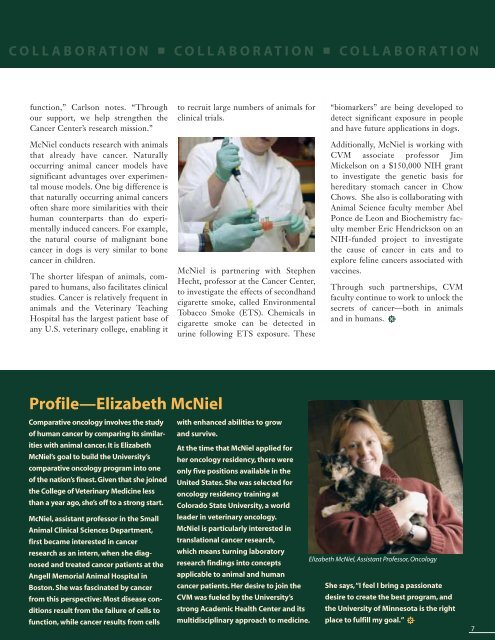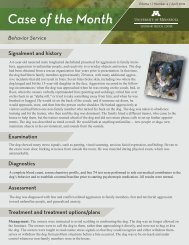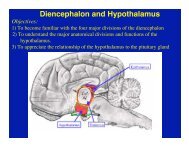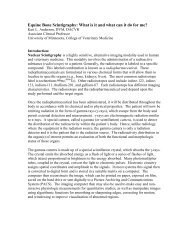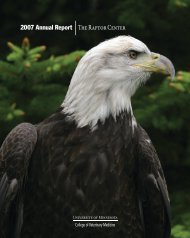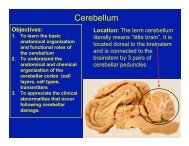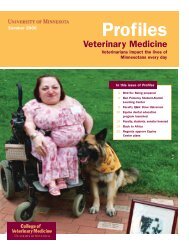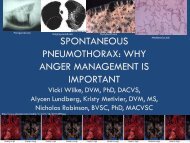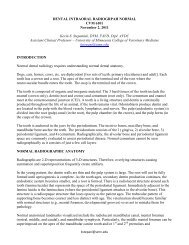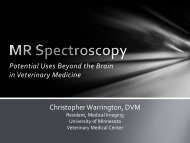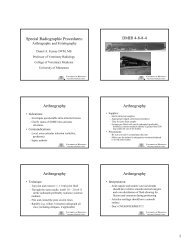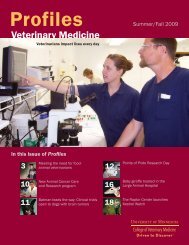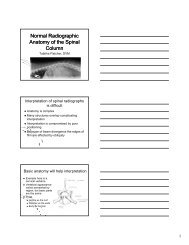Spring 2003 - University of Minnesota College of Veterinary Medicine
Spring 2003 - University of Minnesota College of Veterinary Medicine
Spring 2003 - University of Minnesota College of Veterinary Medicine
- No tags were found...
You also want an ePaper? Increase the reach of your titles
YUMPU automatically turns print PDFs into web optimized ePapers that Google loves.
C OLLABORATION ■ C OLLABORATION ■ C OLLABORATION<br />
function,” Carlson notes. “Through<br />
our support, we help strengthen the<br />
Cancer Center’s research mission.”<br />
McNiel conducts research with animals<br />
that already have cancer. Naturally<br />
occurring animal cancer models have<br />
significant advantages over experimental<br />
mouse models. One big difference is<br />
that naturally occurring animal cancers<br />
<strong>of</strong>ten share more similarities with their<br />
human counterparts than do experimentally<br />
induced cancers. For example,<br />
the natural course <strong>of</strong> malignant bone<br />
cancer in dogs is very similar to bone<br />
cancer in children.<br />
The shorter lifespan <strong>of</strong> animals, compared<br />
to humans, also facilitates clinical<br />
studies. Cancer is relatively frequent in<br />
animals and the <strong>Veterinary</strong> Teaching<br />
Hospital has the largest patient base <strong>of</strong><br />
any U.S. veterinary college, enabling it<br />
to recruit large numbers <strong>of</strong> animals for<br />
clinical trials.<br />
McNiel is partnering with Stephen<br />
Hecht, pr<strong>of</strong>essor at the Cancer Center,<br />
to investigate the effects <strong>of</strong> secondhand<br />
cigarette smoke, called Environmental<br />
Tobacco Smoke (ETS). Chemicals in<br />
cigarette smoke can be detected in<br />
urine following ETS exposure. These<br />
“biomarkers” are being developed to<br />
detect significant exposure in people<br />
and have future applications in dogs.<br />
Additionally, McNiel is working with<br />
CVM associate pr<strong>of</strong>essor Jim<br />
Mickelson on a $150,000 NIH grant<br />
to investigate the genetic basis for<br />
hereditary stomach cancer in Chow<br />
Chows. She also is collaborating with<br />
Animal Science faculty member Abel<br />
Ponce de Leon and Biochemistry faculty<br />
member Eric Hendrickson on an<br />
NIH-funded project to investigate<br />
the cause <strong>of</strong> cancer in cats and to<br />
explore feline cancers associated with<br />
vaccines.<br />
Through such partnerships, CVM<br />
faculty continue to work to unlock the<br />
secrets <strong>of</strong> cancer—both in animals<br />
and in humans.<br />
Pr<strong>of</strong>ile—Elizabeth McNiel<br />
Comparative oncology involves the study<br />
<strong>of</strong> human cancer by comparing its similarities<br />
with animal cancer. It is Elizabeth<br />
McNiel’s goal to build the <strong>University</strong>’s<br />
comparative oncology program into one<br />
<strong>of</strong> the nation’s finest. Given that she joined<br />
the <strong>College</strong> <strong>of</strong> <strong>Veterinary</strong> <strong>Medicine</strong> less<br />
than a year ago, she’s <strong>of</strong>f to a strong start.<br />
McNiel, assistant pr<strong>of</strong>essor in the Small<br />
Animal Clinical Sciences Department,<br />
first became interested in cancer<br />
research as an intern, when she diagnosed<br />
and treated cancer patients at the<br />
Angell Memorial Animal Hospital in<br />
Boston. She was fascinated by cancer<br />
from this perspective: Most disease conditions<br />
result from the failure <strong>of</strong> cells to<br />
function, while cancer results from cells<br />
with enhanced abilities to grow<br />
and survive.<br />
At the time that McNiel applied for<br />
her oncology residency, there were<br />
only five positions available in the<br />
United States. She was selected for<br />
oncology residency training at<br />
Colorado State <strong>University</strong>, a world<br />
leader in veterinary oncology.<br />
McNiel is particularly interested in<br />
translational cancer research,<br />
which means turning laboratory<br />
Elizabeth McNiel, Assistant Pr<strong>of</strong>essor, Oncology<br />
research findings into concepts<br />
applicable to animal and human<br />
cancer patients. Her desire to join the She says,“I feel I bring a passionate<br />
CVM was fueled by the <strong>University</strong>’s<br />
desire to create the best program, and<br />
strong Academic Health Center and its the <strong>University</strong> <strong>of</strong> <strong>Minnesota</strong> is the right<br />
multidisciplinary approach to medicine. place to fulfill my goal.”<br />
7


